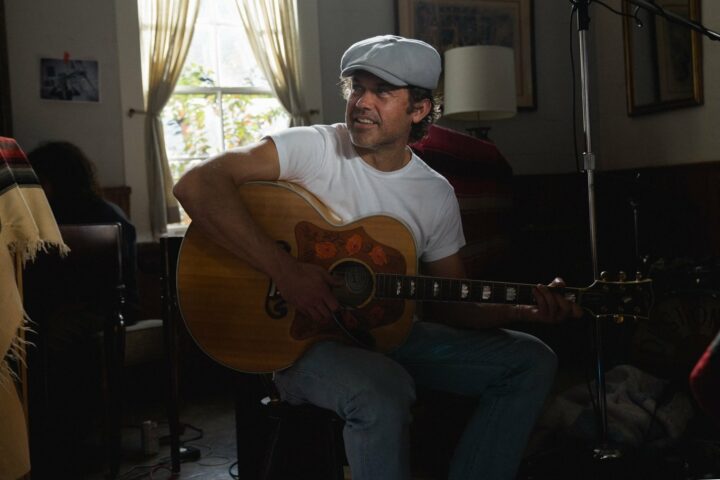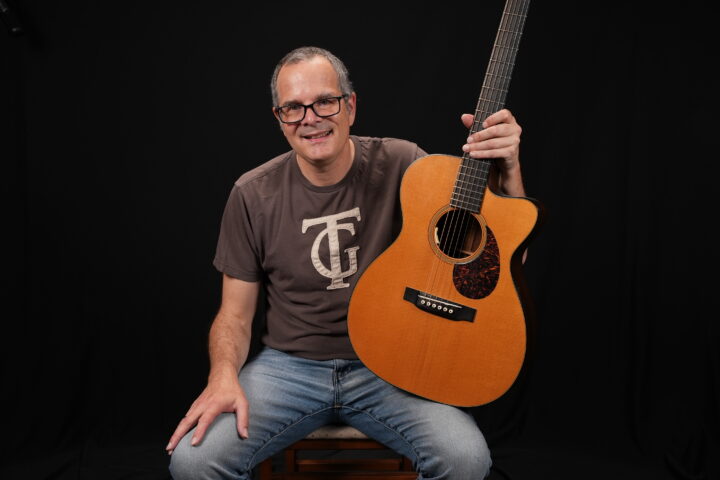I’ve never spoken to Bob Dylan, but I have to imagine it must be a bit like the three times I’ve interviewed Daniel Romano. The ever-evolving Romano – who seems capable of everything from heartfelt Americana to face-melting psych-rock (not to mention an entire track-for-track remake of Dylan’s own Infidels as though it was performed by the Plugz) – is always a bit of a mystery.
Most of my questions to the Canadian musician are met with a sly smile and, I have to assume, the occasional B.S. peppered in. (It’s hard to believe bass player Roddy Holiday is touring with Rick Danko’s actual bass, but who knows?) But Romano is also surprisingly sincere when he talks about his one-of-a-kind creative process and work ethic. Ultimately, a little mystique never hurt anyone and Romano’s brilliant music – not to mention his live shows with the Outfit, truly some of the best I’ve seen in years – is what matters.
For this chat, Romano and company – including Holiday, Julianna Riolino, and Carson McHone – came by the Fretboard Journal before their show at Seattle’s Substation. We talked about his sprawling La Luna release, which he recorded as a 30-minute uninterrupted suite, drums-first, the dangers of listening to other people’s music, and a lot more.
I hoped that Romano would perform another song for our cameras, as he did back in 2019. Since their gear was locked up in their trailer, he grabbed a vintage Martin tenor guitar hanging on our wall, sat in a corner for a few minutes tuning by ear, and then unveiled an acoustic version of “The Motions” from his 2021 album, Cobra Poems, with Riolino and McHone on vocals. (The tenor’s tuning, for those curious, turned out to be BEG#B.)
Fretboard Journal: Was that the first time you attempted to play tenor guitar?
Daniel Romano: This is the first time I’ve played a tenor guitar in the tuning that we just invented really quick. It’s probably just open-something. I don’t know much about guitar, really.
FJ: I don’t believe that at all.
DR: It’s kind of true. I can find stuff with my ears, but I don’t know necessarily where the fingers should go or what it means.
FJ: It hasn’t slowed you down. You’ve had quite a prolific few years.
DR: That’s true.
FJ: Let’s talk about the latest release, La Luna?
DR: Yeah. That has actually quite some chords in it.
FJ: How did that come to be and what was the idea behind it?
DR: The idea was to write an overture and then build from that overture to a full-spectrum piece of music. The concept came out of the music, and the concept can be left up to interpretation. But I wrote an overture and that was sort of the big experiment. Once I had that, I just sort of dissected it into pieces of music that were expanded. That’s essentially it.
FJ: When you say it was written, do you mean in notation?
DR: No, I don’t know how to do that. It was just on an acoustic guitar, in a little room. I did two parts: I sort of made the structure of the whole thing as I went along. I started with the overture and I did some chording and then hummed a melody. And then I would follow that melody with another acoustic guitar, just to sort of chart the course.
I wrote the whole thing with two guitars, one doing chords and one doing melody…and then wrote all the words to fit and built it from that foundation.
FJ: Were you listening to music with overtures or classical music during this time?
DR: No, I referenced nothing. [laughter]
FJ: What was the actual recording process? How much of a band was there for that?
DR: Everybody was on it. I didn’t expand it musically at all before. Sometimes I’ll send these folks almost-finished thoughts, but the last bunch of times, I kept it pretty bare bones. We just sort of built whatever it was going to be from nothing, starting with drums, and then bass and then all the other stuff.
I had a guide vocal and maybe harmonies so that it made some kind of sense as to where you were and what was happening and the overall sort of vibe of what should happen rhythmically and what the root might be. But that was essentially it.
Weirdly, we started with drums. The drums that you hear on the record, which are at times pretty full-on, playing over the top of two sketchy acoustic guides and some quiet, close-mic singing of what I imagined to be what it is now.
FJ: What were the two acoustic guitars you used?
DR: A Sigma. It was just the same guitar, twice.
FJ: The finished product on Spotify is two long tracks. Did you envision it to be just one long track?
DR: Yeah. It is one long track. Format-wise, we had to have a side break. I was thinking LP, so we had to have that side break. That’s it. Technically, the master didn’t have a side break. It just kind of tweeted along, and there’s some tweeting, little chirpy tweets. Then it came back in for the b-side…or what became the b-side. But we had to fade it out, because those grooves don’t last forever.
FJ: But, in terms of recording, you did it in two 12-minute sections?
DR: No, it was recorded in 33 minutes. Top to bottom.
FJ: That’s crazy.
DR: Yeah.
FJ: Have you performed La Luna in its entirety live?
DR: No, no, no.
FJ: Could you? Would you?
DR: I think we could. I think we’re capable of anything, but we haven’t tried it yet. We’ve teased a few things here and there. But it’s in support of us. We’re not in support of it. We’re out here and it’s supporting us.
FJ: I read on Bandcamp that there are 12 movements in there.
DR: Yep.
FJ: Was there a story there in your head as to each movement?
DR: Yeah, I had a pretty good idea of how I wanted it to be structured, as far as the narrative and the lyrics. The melody and everything lent itself to a particular idea for me. I just sort of followed that through.
FJ: We’re talking in October 2022. How far out are you in terms of records that you’ve already conceptualized or recorded that haven’t seen the light of day yet?
DR: Well, we’re all really far out…as people. [laughter] I would say it’s modest compared to the last couple of years as far as withheld output. But we’ve got plans.
FJ: What actually happened to the Dylan Plugz record? It was on Bandcamp, but it seems to have disappeared.
DR: Because we’re going to issue it on a physical medium.
FJ: I was worried that there was a lawsuit or something.
DR: No, we’re tight with Bob.
FJ: Did anyone from the Plugz ever reach out to you?
DR: All the living Plugz did. And the guitar player from the Nerves reached out. And various comedians, weirdly.
FJ: It’s popular with comedians?
DR: Yeah. It’s [mentioned] in the liner notes of the newest Bob Dylan bootleg series. They reference it.
FJ: You’ve always had these – some would say insane, some would say brilliant – parameters around your recordings and even your live band setup. What is the gear you’re using for this tour?
DR: Yeah, that can be interesting. Well, Roddy’s using a classic SVT [amp]. He’s got Rick Danko’s bass…an Ampeg AMUB-1. It’s the one you can see in The Last Waltz, in the sound stage scenes.
I’m just using a guitar. I’m using a Greco Rickenbacker, which is my guitar of choice now. A Greco Rickenbacker 330…what do they call it? RG-100 or RG-95? They have a lot of different model names for it, probably because of various lawsuits. But I have two of them now. One’s a 12-string that I’ve gutted to be a six, and the other is a six by nature.
I’m using a 1963 blonde Fender Bassman head and a blackface 1964 Fender Bassman head. Then I’ve got two cabs, which are actually PA speakers by a British company called Sound City. Four twelves in each cab. Total of eight, for the mathematicians out there. One speaker may be broken.
I use a tuner, a [Boss] TU-3. And I use a Univox Super Fuzz. The original…before the red one. Everything I have is Japanese except my amps, I think.
FJ: Was that by design?
DR: It’s, I think, an accident. It’s happenstance.
FJ: Going back to La Luna and the overture that came to you. You weren’t listening to a bunch of classical music, so what are you listening to? What are you playing in the van right now, if anything?
DR: We were just listening to Freakonomics. We don’t listen to music.
FJ: Really?
DR: It’s infectious, in a bad way. Other people’s music is dangerous. We try not to be influenced. We got to stay pure out there. It’s a tough world.
FJ: What’s the last great book you’ve read?
DR: I don’t like reading a whole book. I like jumping around and reading a couple of pages and then jumping to a different book. All my books are about the same stuff anyway. Every book I buy is just the same thing. I can’t tell you what that is.
FJ: Are you going to be writing any more books yourself?
DR: I have something almost done, but I haven’t really had time to look at it in a while. It might suck.
FJ: What’s your setup at home? Do you all live …
DR: We all live together in a big room.
FJ: That I don’t believe. But do you live in the same neighborhood?
DR: Yeah. We’re all very close, within 10 minutes of each other. And then our studio is 11 minutes.
FJ: And what’s the studio look like?
DR: It kind of looks like a jungle gym mixed with a 1970s school gymnasium sort of thing. Our dividers look like if clowns worked in an office space.
FJ: I think I’ve seen that in one your videos. Did those panels come from an office space?
DR: No, we built them all, from scratch.
FJ: And you have that studio ready to go whenever inspiration hits?
DR: That is the idea. And no one else can go there, so don’t even frigging try.
Don’t even call me or write me about it. It’s never going to happen. It’s cool, though. We got some cool stuff there.
FJ: Do you have gear that never leaves that studio? Guitars that are too precious to take out on the road?
DR: No, we try not to be precious about anything really. That’s our modus operandi. Zero preciousness…and most of it’s broken. There’s like a tape machine graveyard, so many broken capstans, and pinch rollers, just crumbled to dust…gunked up, gunked out.
FJ: Well, you made an old tenor guitar sound good 20 minutes ago.
DR: That one sounds nice, though.
FJ: Thanks for coming. It’s always fun.
DR: Always a pleasure to talk to you.


